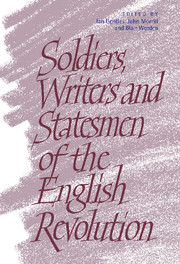Book contents
- Frontmatter
- Contents
- Preface
- Austin Woolrych: an appreciation
- 1 Secret alliance and Protestant agitation in two kingdoms: the early Caroline background to the Irish Rebellion of 1641
- 2 Of armies and architecture: the employments of Robert Scawen
- 3 George Digby, Royalist intrigue and the collapse of the cause
- 4 The iconography of revolution: England 1642–1649
- 5 The casualties of war: treatment of the dead and wounded in the English Civil War
- 6 ‘A bastard kind of militia’, localism, and tactics in the second civil war
- 7 Cromwell's commissioners for preserving the peace of the Commonwealth: a Staffordshire case study
- 8 Colonel Gervase Benson, Captain John Archer, and the corporation of Kendal, c. 1644—c. 1655
- 9 Repacifying the polity: the responses of Hobbes and Harrington to the ‘crisis of the common law’
- 10 Equality in an unequal commonwealth: James Harrington's republicanism and the meaning of equality
- 11 John Milton and Oliver Cromwell
- 12 From pillar to post: Milton and the attack on republican humanism at the Restoration
- 13 ‘They that pursew perfaction on earth …’: the political progress of Robert Overton
- 14 Locke no Leveller
- A bibliography of the writings of Austin Woolrych, 1955-95
- Index
3 - George Digby, Royalist intrigue and the collapse of the cause
Published online by Cambridge University Press: 10 November 2009
- Frontmatter
- Contents
- Preface
- Austin Woolrych: an appreciation
- 1 Secret alliance and Protestant agitation in two kingdoms: the early Caroline background to the Irish Rebellion of 1641
- 2 Of armies and architecture: the employments of Robert Scawen
- 3 George Digby, Royalist intrigue and the collapse of the cause
- 4 The iconography of revolution: England 1642–1649
- 5 The casualties of war: treatment of the dead and wounded in the English Civil War
- 6 ‘A bastard kind of militia’, localism, and tactics in the second civil war
- 7 Cromwell's commissioners for preserving the peace of the Commonwealth: a Staffordshire case study
- 8 Colonel Gervase Benson, Captain John Archer, and the corporation of Kendal, c. 1644—c. 1655
- 9 Repacifying the polity: the responses of Hobbes and Harrington to the ‘crisis of the common law’
- 10 Equality in an unequal commonwealth: James Harrington's republicanism and the meaning of equality
- 11 John Milton and Oliver Cromwell
- 12 From pillar to post: Milton and the attack on republican humanism at the Restoration
- 13 ‘They that pursew perfaction on earth …’: the political progress of Robert Overton
- 14 Locke no Leveller
- A bibliography of the writings of Austin Woolrych, 1955-95
- Index
Summary
On Sunday 26 October 1645 the king was at dinner in Newark garrison, where twelve days earlier he had sought security with what remained of his army. At this moment some very aggrieved senior officers, who had recently lost their posts in his service, burst into his presence. They were led by Prince Rupert, the king's nephew and former commander-in-chief, his brother Maurice, and Charles Gerard, lately sacked from his command of South Wales. They had come to protest that the king had replaced one of their followers, Sir Richard Willys, as governor of Newark. They knew whom to blame for this dismissal, and for their own. The exchange between them was recorded in a London newsbook:
prince: By God the cause of all this is Digby.
king: Tis false.
ger.: I am sure, and can prove that Digby was the cause that I was outed of my command in Wales.
king: Whosoever saies it [,] Iyes. Gentlemen I am but a child so you esteem of me: Digby can leade me by the nose, but you shall find …
prince: I wish that Digby prove not a traytor at the last.
king: By God Digby is an honest man, and they that say otherwise are in effect traytors.
ger.: Then we must be all traitors.
The king's cause, after Naseby and the surrender of Bristol, was collapsing about him, and the generals were looking for scapegoats. Digby, one of the secretaries of state since the death of Lord Falkland at the first battle of Newbury in September 1643, had been at the centre of affairs for two years.
- Type
- Chapter
- Information
- Publisher: Cambridge University PressPrint publication year: 1998
- 3
- Cited by



